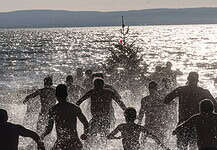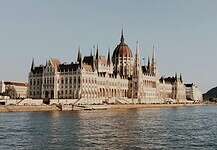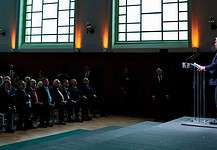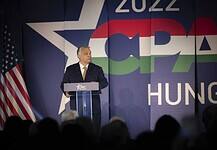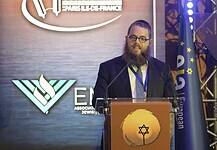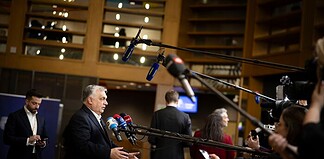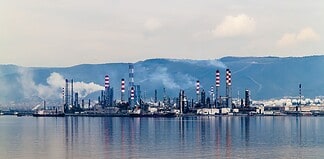by Agnes Sylvester Fulop
It was a regular school day with regular class schedule for Tuesday. As I did at the beginning of every school day, I wrote the date in my note book. It was October 23.
In the morning my mother talked about my upcoming birthday party. So, going home from school in the afternoon I was thinking about inviting my girlfriends to the celebration. In school I belonged to a study group that stayed there after the regular class hours; it was 4 pm when I left for home. My school was on Isabella Street on the Pest side and I lived on the Buda side of the city close to the Southern Train Station. Traveling home on the ring boulevard everything seemed to be the same, as was every day. The streetcar – everybody called it “the #6” – was crowded as usual, although there seemed to be more pedestrians walking on the sidewalks.
When the streetcar reached the Western Train Station the traffic came to a halt. Here people were walking toward the Danube and the Margaret Bridge not only on the sidewalks, but on the traffic lanes as well. Excitement filled the air. I got off the streetcar and walked with the crowd. When we arrived to the corner of the famous Budapest-theater, the “Vigszinház”, it became obvious that it was impossible to get across the Margaret Bridge to Buda. Thousands of people marched from rail to rail on the bridge toward us. They were singing Kossuth songs, from the 1848 Hungarian Revolution and Freedom Fight. Hungarian flags were floating in the wind, above the crowd. “We are coming from the memorial statue of Bem”- they shouted. Jozef Bem was a famed and well-respected Polish general, who volunteered to fight on the Hungarian side in the 1848-49 uprising.
The huge crowd moved slowly on St. Stephen Boulevard, sometimes stopping and waiting patiently to join other waves of people coming from Buda. Windows opened on adjacent buildings; they were filled with waiving hands, singing and smiling faces. On one of the balconies little kids and their kindergarten teachers waved their small Hungarian paper flags to the crowd. “Vivat, Vivat” people shouted back to them. They laughed happily, sang, clapped and all faces were lit up by smile.
Oh God, what is happening? I totally forgot my birthday plans.
As a 15-year old, I was not interested in politics. I just couldn’t understand the many strange and unfair turns of the communist rules and regulations in our daily lives. My parents’ grave warnings to be very careful what we talk about outside of our home became ingrained in us kids. In these years people were jailed by the government if they were accused by anyone as enemy of the communist party and the government.
But here it was something absolutely different happening: great and surprising event and the air of free expression after many terrifying years of terror. Something unbelievably beautiful…! And I witnessed this fantastic day!
The shoulder-to-shoulder crowd simply absorbed and carried me into the side streets, toward the State Capitol (Parliament Building). I marched along with them we talked, sang and shared the happy moments and liberated feelings.
Sunset painted the Fisher Bastion and the Matthias Church to a magical, glittering red color. The streetlights lit up as a series of pearls on the sidewalks. The huge five point red star dominated the top of the Parliament Building. Finally the many thousands of demonstrators stopped on the Kossuth Plaza at the Parliament. I was relatively close to one of the lion statutes guarding the entrance. The excited, singing and peaceful crowd was just growing, filling up the entire plaza and extended into the adjacent streets everywhere. Someone cried out and began chanting:” Turn off the light of the red star, energy waste won’t be so high!” The crowd picked up the slogan and loudly repeated it. More and more slogan came up that everybody shouted in rhymes. Another voice emerged: “Confiscated Church-properties should be given back to all Churches!” People turned back right away with disagreement: “This is not the time for this, first we want freedom! Russians go home!” There were several speeches given from the balcony of the Parliament by well known politicians and student leaders of the demonstration. Actors recited the National Anthem written by Ferenc Kolcsey as a poem and other rousing, beautiful poems about freedom by Sandor Petofi.
A young college man touched my arm gently: “You don’t have a rosette (kokarda) yet”- said and he pinned a tiny tricolor ribbon to my coat collar. He smiled and stepped to the next person. My heart was filled with faith and enthusiasm.
I still have this little piece of red-white-green ribbon that I cherish as one of my great treasures. It has reminded me over the years that I was there in a historic time when Hungarians bravely stood up for their freedom.
When Imre Nagy a respected politician stepped out on the balcony of the Parliament to give a speech I couldn’t stay any longer. It was late in the evening and I feared my parents would be very worried about me. Slowly, step by step I managed to wiggle out of the thrilled and excited crowd of demonstrators. At this time the simple pontoon bridge named Kossuth Bridge was a functional connection between Buda and Pest. I chose to take this short cut my way home, running through narrow little streets up the Castle Hill and down on the other side. My heart was pounding, filled with never experienced impressions and emotions and I could hardly wait to share them with my family.
My parents were relieved to hug me because many hours passed after I’d left school and I finally showed up. As I learned later, my father was also on the Kossuth Plaza, but, of course, it was impossible to meet each other on the huge space filled with hundreds of thousands of people shoulder to shoulder. I told them everything I saw in the afternoon. My parents, my brother and little sister, my 92 years old great grandmother and my grandmother were listening to my stories. My “grannies” had lived with us after they had been bombed out of their home and lost everything they owned in a carpet bombing of WWII. My great granny who was completely alert mentally beamed from happiness when said: “Oh Lord, thank you for giving me the chance to see freedom again. Maybe I’ll live to see my great grandchildren learning the truth in school, not ridiculous and distorted statements about almost everything, like they called my favorite poet and freedom fighter, Sandor Petofi a communist! Communism did not even exist at his time.”
Late in the evening we were “hanging on” the radio’s news. We heard the speech of Erno Gero (first Secretary of the Communist Central Committee) filled with repulsive and outrageous statements. My father’s eyes were flashing in anger and in a choked voice he whispered his thoughts to my mom. A little later loud noise and shouting was heard from the streets and drew us to the windows facing the Vermezo Park and the Moscow Square. On the street we saw a big truck packed with young people holding up a soaring Hungarian flag with a hole in the middle heading in our direction. The despised communist seal was cut out of the flag. The voices got lauder finally it became comprehendible: “The Stalin statue was toppled! The Stalin Statue has been destroyed!”
Oh my God! It is unbelievable! We were thrilled …
They were, of course, referring to the humongous statute of Stalin erected in place of a church in the Pest City Park.
New and new information spread, everything happened so fast. Like a sharp knife piercing hope the news was relayed that serious shootings happened at the Radio Station.
There had been so much unimaginable happenings that day it was hard to go to sleep.
It was still dark, when we awoke in the early dawn hours to a chilling, roaring, rumbling noise. That spring there had been an earthquake of 5.6 on the Richter scale in Budapest and vicinity. It was very scary. The trembling of the apartment building was similar to that. What is happening this time? We ran to the windows. The roaring, earsplitting noise was increasing. It was shaking up our stomach and froze our heart. In less than a minute we saw: from behind the corner of our building suddenly emerged the first Russian tank followed by the next and a never ending cue of others. These monsters were creaking and rattling on the cobblestone road as they proceeded passing our building moving toward the Moscow Square. The top door of each tank was opened and a dark figure rose out of each machine. Fear started flowing into my heart. The peaceful demonstration yesterday, the cheerful mood, songs and hopes of the multitude and our belief in miracle… seemed to have faded far away in this early hour of threatening, gloomy daybreak. Our fearful eyes couldn’t see the end of the line of those thundering tanks.
Next day on the 24th schools were closed. Everybody in my family hurried to stand in line to buy food. Just in case, because everything became uncertain and we wanted to store some groceries. My alert mom was able to get salami, that wasn’t easy to buy in these days. In fact, this was the first time I ate salami in my life.
Tension was vacillating in the air all day. Everyone sensed that something would happen soon. The news spread about fighting and shootings in different parts of Budapest, especially at the building of the Radio Station.
Early afternoon the freedom fighters pushed railroad cars from the Southern Railway Station to the street intersection and tore up cobblestones of the road to build a barricade that would stop a new column of tanks. It happened very close, just a short block from our building. My uncle who’d heard about the barricade building came over and stayed with us to see if we needed help. Later that evening my father sent us, the children, to a safe room in our apartment away from the bedroom that faced the street. It was getting dark. Suddenly, we heard the threatening noise of a tank coming toward our building. The tension was increasing to a stretching point. A series of gunshots came from the barricade. The tank responded and enormous detonation shocked our flat because the shot hit our building. Then another firing came. Our windows broke and the panes shattered on the floor in million little peaces. “Everybody hurry, run to the shelter!”-cried my dad. My uncle hugged my great grandmother, lifted up her frail body on his shoulder and ran out of our apartment down the stairs to the underground area. There was panic on the staircase; yelling and crying residents were running down from seven floors. A family with two little children was crawling on their knees out of a huge cloud of dust. Oh God! The memories of WWII just came back! Huddling in the cellar we could hear the fight above us. Shootings, detonations filled the air. Some people carried a wounded man down to our shelter. It was a Russian soldier who was shot in his lung. He was laid down on a blanket and a couple people ran for doctor. The soldier cried out for his mother. This detested, wounded enemy was the beloved son of someone… somewhere… We the youngsters were sent away from this site. My heart sank. I never found out if they could save him.
Next day, on the 25th my father left for work as usual. He was a lawyer at the Ministry of Agriculture. During the early fifties he lost his job as a “class-alien” because of his background and because he declined to become a member of the communist party. In the spring of 1956 he was asked by the Department to come back to work in the same position because his knowledge and the high quality work he had done was much needed.
The 25th of October is remembered as “Bloody Thursday”. Again thousands of people marched to the Parliament and on the plaza they were caught between the crossfire of Soviet tanks and the Hungarian secret police. As the building of the Agriculture Ministry was facing the Kossuth Plaza and the Parliament Building he and his colleagues witnessed what happened on the square. We had already heard about the horror and the slaughtering of hundreds of innocents on the plaza. I would never forget the scream my mom gave out as she flew into the arms of my father very late evening on that day, when he finally arrived home exhausted, but alive and safe. My father told us how he and many of his colleges in the department tried to save panicking people, who were desperately running for their lives, pulling them through the first floor windows into the building. He also told us about the communist party secretary of the Department, who was yelling furiously, ordering the Ministry staff to close all windows and doors to keep the rebellious men, women and children out of the building. That would have meant to simply let them be shot to death on the street. Father wept as he told us, how the secret (AVO) police men hunted people down one by one, under the arcades of the building. He described how horrible was seeing the piled up bodies of the dead around the Rakoczi statue on the plaza. No word was fit to express our feelings…
Days passed and the fights got more serious. We heard reports about additional divisions of the Russian army entering Hungary at our Eastern border and advancing upon Budapest. Apparently, the Russian troops that had stationed for years at Szekesfehervar, at Gyor, on the Szentendre Island and elsewhere were not enough to crush the revolution.
By November 4 the advancement was complete and they attacked Budapest at dawn. It was a tragic day.
At this time I was allowed to go out only as far as the nearby grocery store. Although I was not involved in fighting I learned the names of Pal Maleter, Gergely Pongracz and Szabo bacsi. People were talking about serious fights on the Pest side at the Corvin Passage and at the Kilian Army Post Building on the Ulloi Avenue. Also there was serious street fighting on the Buda side at the Szena Square, at the Viennese Gate that was an entrance to the historic Castle District. In the following days the Soviets bombed the Kilian Army Post and the Moricz Zsigmond Plaza. One night when we heard the explosions of bombs and ran to our windows that faced the Vermezo Park and the Castle Hill district too, we watched in horror the burning roof of the National Archives. The blazes colored the entire horizon red and the flames were spreading fast. This horrifying scenery showed me the nonsensical and mindless waste a war can inflict.
The fights had grown worse and merciless. We, the three kids moved to my other grandmother’s place, because her home was safer in the back hills of Budapest. Even there we experienced gunfire over our heads because two fighting groups, freedom fighters on one and Russians on the opposite hill had set up their lines and they were shooting at each other. Later most of us got used to standing in line for bread while the adjacent street was under gunfire. One day I was in cue for milk, when a Russian tank showed up at the corner. The tank slowly moved closer with a rattling noise, stopped and lowered its cannon aiming what seemed like the people standing on the street. Everybody ran in all directions. A smaller group tried to hide in the store. They pushed me in, too. I was stuck and scared. What would happen if the tank just fired into the store? After a few breathtaking minutes that seemed like hours to me, the monster moved on. The fear remained in my mind for a long time.
What happened to the faith in freedom that filled the people’s heart just a few days ago? What happened to the powerful will that bonded Hungarians together, from the capitol city to little villages with the great dream of freedom?
Many escaped to avoid the Soviet reoccupation. More than 200,000 men, women, children left the homeland because of fear and to find a better future in the West.
We listened to Radio Free Europe and Voice of America constantly. Hungarians were wishing for help desperately that would come from the West. Many families hoped to get radio messages from loved ones or friends who made it to the “free world”. Often it was hard to understand reports in the radio from the West, because of the jamming noises. Our apartment was still in the dark; all front windows were covered by plywood after we lost the glass of the windows. People in Budapest stayed home in the evenings for it wasn’t safe to go outside. Rumors spread fast about robberies, attacks, assaults. Who was doing this to us? One late evening a spine-chilling scream of a woman broke up the quiet hours. It came from the street. We became numbed with fear. What is happening? Who is in danger? After a while the prolonged, desperate screaming died down leaving us in a feeling of helplessness and a sense of terror.
In mid-December my great grandmother became ill. She lost her dreams to see Hungary free from communist and Soviet domination. The first euphoric feelings faded out fast and disappeared when it became obvious that the Russian army crushed our revolution. The fight for Hungary’s freedom seemed over. My great granny had been born 1864, three years before the Hungarians made the compromise agreement with the Habsburgs following a heroic 1848-49 freedom fight that Austria crushed with the help of the Russian Czar’s army. Granny survived WWI, the 1919 short-lived Communist take over in Hungary. She lost everything during WW II, when her home was bombed to the ground. Now she lost her will to live. Now, she refused to eat, just laid in bed with her prayer book in her hands. She left this world just two days before her 92 birthday. There was a rattle of firearms in a distance when we buried her in the cemetery.
When school started again many of my classmates were missing. They fled the country with their parents or family. We were sad to learn the fate of our favorite gym teacher who was a famous athlete competing in pentathlon. His athletic figure became part of the design on the backside of the 20 Forint paper money. He was shot on the street when he went to his mother’s house to bring food for her. For us he was an exceptional coach and teacher, and so young… as young as many boys and girls, the fearless, bravest of the braves who also perished.
The regular classes started again at the end of January. Strange silence surrounded the turbulence of the preceding few months. But that year instead of the required Russian language we started studying German. That stopped again with the school year and we resumed studying the Russian language next September. People talked about revenges of the government, arrests, prisons and concentration camps, even executions of young rebels. We were gripped by an insecure and fearful feeling for years. But then life slowly started changing for the better. I never found out, whether I was on a list of monitored people, because my cousin sent letters and postcards to me from Germany and later from California…
“A nation cried out. But the only echo was silence.”
(Quotation from Sandor Marai’s “Angel from Heaven…” New York, 1956)
Agnes Sylvester Fulop -2006, January


